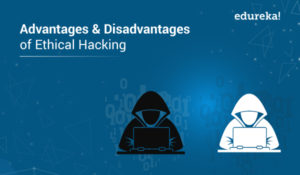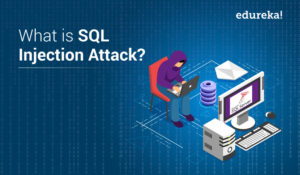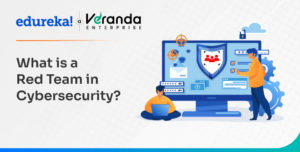Ethical Hacking has been a lucrative career option for many, and not without good reason! It’s a challenging job that never gets boring, pays well and also brings a greater sense of achievement. In this “Ethical Hacking Career” article, we are going to go over the various factors to guideline your path to become an ethical hacker:-
Who is an Ethical Hacker?
“To beat a hacker, you have to think like one” – Ethical Hacking Council
Hacking is the process of finding vulnerabilities in a system and using these found vulnerabilities to gain unauthorized access into the system to perform malicious activities ranging from deleting system files to stealing sensitive information. Hacking is illegal and can lead to extreme consequences if you are caught in the act. People have been sentenced to years of imprisonment because of hacking.
Nonetheless, hacking can be legal if done with permission. Computer experts are often hired by companies to hack into their system to find vulnerabilities and weak endpoints so that they can be fixed. This is done as a precautionary measure against legitimate hackers who have malicious intent. Such people, who hack into a system with permission, without any malicious intent, are known as ethical hackers and the process is known as an ethical hacking.
Requirements to Become an Ethical Hacker
How your ethical hacking career begins depends on your current field of work. If you’re not in an IT field you should definitely try shifting into one. Even though most jobs require you to have a Bachelor’s degree in computer science or cybersecurity-related field, exceptions are made for people with sound knowledge of operating systems, databases and networking! Also, it is nigh impossible to directly become an ethical hacker. Most ethical hackers begin their career as tech support engineers who climb their way up, by earning certifications like CCNA and CISSP before working towards the ultimate CEH certification. After earning your CEH certifications, is the time to market yourself as an ethical hacker!
Now let us go over the roles and responsibilities of an ethical hacker.
Join the elite cybersecurity professionals and boost your career with CISSP Certification.
Roles & Responsibilities of an Ethical Hacker

There seems to be a general misconception that a person with an ethical hacking career is only responsible for penetration testing of systems and applications. This is not true, and an ethical hacker is responsible for much more.
- Scanning open and closed ports using Reconnaissance tools like Nessus and NMAP
- Engaging in social engineering methodologies
- Examining patch releases by performing vigorous vulnerability analysis on them
- An ethical hacker will see if he/she can evade IDS (Intrusion Detection systems), IPS (Intrusion Prevention systems), honeypots and firewalls
- Ethical hackers can employ other strategies like sniffing networks, bypassing and cracking wireless encryption, and hijacking web servers and web applications
An ethical hacker strives to replicate the working of a black hat hacker by analyzing the defense protocols and social-engineering aspects of an organization. His job is to make sure the organization reacts to these situations well enough if they are already not doing so. Go through our Ethical Hacking Certification Course to explore more about ethical hacking. This course will teach you the most current hacking techniques, tools and methods that hackers use.
Also Read: Difference Between a Black Hat Hacker and An Ethical Hacker
Ethical Hacker Skill Set

A person with an ethical hacking career is expected to be proficient in database handling, networking, and operating systems and also have excellent soft skills as they need to communicate problems regarding security to the rest of the organization. Other than these generalized skillsets, an ethical hacker also have a good grasp on the following skills:
Network traffic sniffing
- Orchestrate various network attacks
- Exploit buffer overflow vulnerabilities
- SQL injection
- Password guessing and cracking
- Session hijacking and spoofing
- DNS spoofing
Apart from this, an ethical hacker must be a creative thinker because black hat hackers are constantly coming up with ingenious ways to exploit a system and it is an ethical hacker’s job to predict and prevent such breaches.
Gain valuable insights into the Cyber Security industry and prepare for a successful career path during this Cybersecurity Internship.
Also Read Future Scope of Ethical Hacking
Ethical Hacking Job Trends
Growing at a rate that is outpacing all other areas of IT, cybersecurity has emerged as a high-growth-field of 2017, and possibly of the entire decade. During the 5 years between 2012 and 2017, listings for cybersecurity jobs increased by a whopping 75% according to the analysis made by the Bureau of Labor Statistics. This has led to a lot of unfilled positions so jobs are plenty and they pay well too.
How much money does an ethical hacker make?
Certified ethical hackers make an average annual income of $80,074, according to Payscale. The average starting salary for a certified ethical hacker is $95,000, according to EC-Council senior director Steven Graham. The founder of NoWiresSecurity, Eric Geier, estimates a more conservative $50,000 to $100,000 per year in the first years of work depending on your employer, experience and education. Those with a few years of experience can pull $120,000 and upwards per year, particularly those who work as independent consultants.
Upskill for Higher Salary with Cyber Security Courses
Ethical Hacking Career: Job Profiles
After attaining the much coveted CEH v10, an ethical hacker can try for the following roles:
- Information Security Analyst
- Security Analyst
- Certified Ethical Hacker (CEH)
- Ethical Hacker
- Security Consultant, (Computing / Networking / Information Technology)
- Information Security Manager
- Penetration Tester
Companies Hiring Ethical Hackers

An ethical hacker finds a job in any company which has an internet facing side or anything to do with the web. These include college institutions like MIT and even private companies ranging from logistic services to data warehousing companies. Apart from these, you also get a chance to work for the military and top-secret intelligence gathering agencies like the CIA, Mossad, NSA
Okay, guys, this brings us to the end of this “Ethical hacking Career” blog. I hope this blog gave you the correct guideline to bootstrap your path to become an ethical hacker. For more information regarding cybersecurity, you could check out my other blogs. If you have any doubts or queries regarding this particular article, leave a comment in the comments section below!
You can also take a look at our newly launched course on CompTIA Security+ Certification Course which is a first-of-a-kind official partnership between Edureka & CompTIA Security+. It offers you a chance to earn a global certification that focuses on core cybersecurity skills which are indispensable for security and network administrators.
If you wish to learn Cybersecurity and build a colorful career in cybersecurity, then check out our Cyber Security Certification Training which comes with instructor-led live training and real-life project experience. This training will help you understand cybersecurity in depth and help you achieve mastery over the subject.


























Thank you for such Stipulated Information